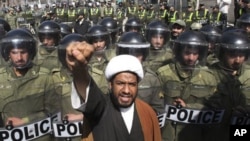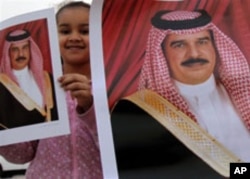While there has been a wave of political discontent sweeping across some nations of the Middle East, the grievances of the protesters and their way of expressing them is different from country to country. So, too, are the governments’ responses. Analysts say Bahrain’s unrest has made one neighbor nervous and another adventurous.
Unlike in other countries, the protests in the tiny island nation of Bahrain have largely been along sectarian lines, with Shi’ite Muslims in the streets calling for reforms from the al-Khalifa royal family, who are Sunnis. The government has not only suppressed the protests, but gotten help from neighboring Saudi Arabia - also ruled by a Sunni monarchy.
Former CIA officer Michael Scheuer, who has extensive experience in the Middle East, says that has the makings for a particularly explosive situation.
"I think it’s the single most dangerous point right now in the Middle East, the Bahraini issue," he said. "The Saudis, with their partners from the Gulf [Cooperation] Council, have moved some military forces in to help the Bahraini government. And that really at the end of the day is a Sunni-Shia conflict. It’s pretty apparent that the Saudis and their neighbors are not going to put up with a Shia state on the peninsula, which they believe, I think, would be a springboard for more Iranian influence."
Fear factor
The fear, says Scheuer, is that Sunni killings of Shi’ites, especially by Saudi troops, could prompt some kind of response from Iran.
"The two Muslim groups, the Sunnis and the Shia, are not just alienated cousins," said the former CIA officer. "They’re determined historic enemies. And the real question comes down to, if it comes to violence and the Sunni forces start slaughtering Shias, what do the Iranians do? Do they sit still and watch their co-religionists get killed? Do they try to start trouble in the eastern province [of Saudi Arabia] to put some pressure on the Saudis?"
The bulk of Saudi Arabia’s oil fields are in its eastern province.
Fears of Sunni on Shi’ite killings are not unusual. According to a recent account by a New York Times reporter, when he waved his American passport to avoid being shot by Bahraini security forces, a policeman said, "We’re not after you. We’re after Shia." Added reporter Michael Slackman, "It was like they were hunting rats."
'Iran's intervention'
Kamran Bokhari, Middle East and South Asia director for the private intelligence firm Stratfor, says Iran would like to move in just as Saudi Arabia did, but its moves are limited by geography since it lies across the Persian Gulf from Bahrain. He speculates Iran might engage in covert activity to help its Shi’ite brethren if it had agents in place before the unrest started.
"The Iranians at this point in time cannot send reinforcements, whatever they may be," said Bokhari. "So they would have had to be in country pre-crisis. And it’s not clear that they have enough assets to mount an insurgency. Definitely they can stir up a mass uprising, but that’s very different from an insurgency. I’m not saying that that can’t happen. But the Shi’ite community in Bahrain is also pretty much divided."
The al-Wefaq Shi’ites are the largest opposition group and are considered more mainstream, holding 18 seats in parliament before they resigned en masse in February to protest police violence against demonstrators. But there is also the hard-line al-Haq movement, which analysts say is philosophically closer to Iran.
Analysts agree that at some point, the ruling al-Khalifa family will have to cut some kind of deal for political reforms, probably by exploiting the split in the Shi’ite community. Kamran Bokhari says that would suit Iran just fine if it is looking at a long-term strategy of extending influence rather than short-term political gain.
"It’s good enough for Iran. It’s not like if they can’t topple the monarchy then all is lost. They can make a partial gain right now and then build upon it in years to come. So any negotiated settlement still empowers Iran. And that’s why you see the Saudis acting really aggressively," he said.
Analysts say any direct Iranian intervention against either Bahrain or Saudi Arabia could also have consequences for the United States. Saudi Arabia and Bahrain are both U.S. allies, and the U.S. Navy’s 5th Fleet is based in Bahrain.





